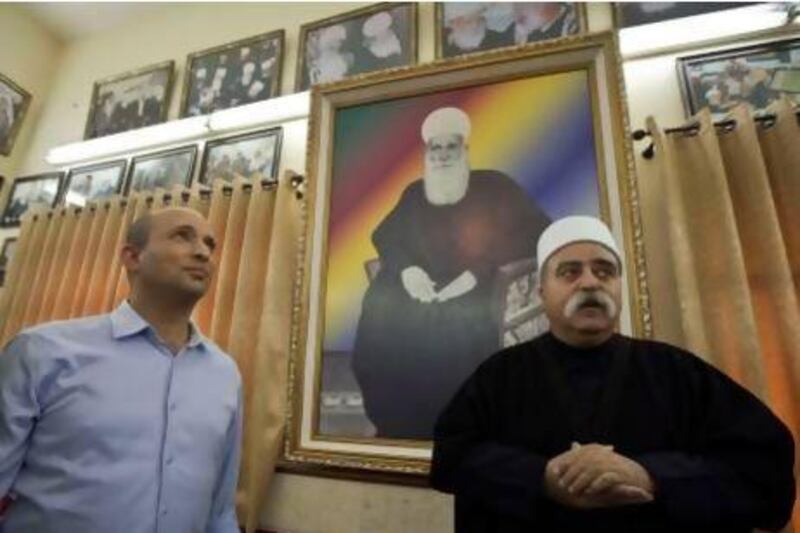TEL AVIV //He is a charismatic former commando and a high-tech millionaire who has become the star of Israel's pre-election season.
But Naftali Bennett, who rejects Palestinian statehood and advocates an Israeli annexation of most of the West Bank, has also become the most controversial candidate vying for election ahead of the January 22 ballot.
Palestinian leaders such as Saeb Erekat, the chief Palestinian negotiator, have blasted Mr Bennett's plan as a potential "war crime" and warned that anyone executing it would "belong behind bars".
At the same time, rivals in the centre and left have cautioned that his addition to the next government could significantly hurt already tense ties between Israel and the United States, its main diplomatic and financial backer over the settlement issue.
Yet such controversy appears to be only prompting a surge in support for Mr Bennett's Jewish Home party at the expense of larger right-wing rival Likud-Beiteinu, the electoral coalition of prime minister Benjamin Netanyahu.
A poll on Thursday showed that Jewish Home could become the second-largest party in the next parliament after Likud-Beiteinu, garnering 18 seats out of 120. That would more than double the seven seats that the two pro-settler parties that have merged into Jewish Home controlling the outgoing parliament.
Even liberal media commentators have gushed over the wide backing the 40-year-old is drawing, especially among young Jews, both religious settlers in the West Bank and secular hardliners in Israeli cities like Tel Aviv.
Mr Bennett is "the hottest story of these elections", Yossi Verter of the liberal newspaper, Haaretz, wrote yesterday.
Yossi Sarid, a prominent left-wing figure, said that the fragmented and quarrelling left-wing parties also need a figure like Mr Bennett to unite them. "The left is growing mould, its ideas are old and positions are worn-out," he wrote in Haaretz yesterday. "When will a Bennett-like leader, who will instil spirit in the moderate left, rise?"
Mr Bennett says he aims for Mr Netanyahu, predicted by polls to regain the premiership, to add him to the next ruling coalition and is reportedly eyeing the housing minister portfolio in a bid to advance settlement construction.
Mr Netanyahu, whose combined electoral ticket of his Likud party and the allied ultranationalist Yisrael Beiteinu movement was projected to win 35 seats in the latest poll and would need at least two other parties in his coalition to reach a majority of parliamentary members.
Analysts say the premier would have to choose between a right-wing coalition that would include Jewish Home and the ultra-Orthodox Shas party or join forces with centrist rivals like Tzipi Livni, an ex-foreign minister, and Yair Lapid, a popular television figure.
Teaming with Mr Bennett, commentators warn, would further antagonise international allies that are already growing hostile towards Mr Netanyahu's expansion of settlements.
"With Bennett, the next government will be even more right-wing than the current one," said Yossi Alpher, an Israeli political analyst. "Netanyahu will again have a right wing-religious coalition and he knows that will get him in trouble with the international community and the Arab world."
In the meantime, Mr Bennett's ideology and CV have drawn him broad support. Scoring points in a country where army service is a valuable milestone for Jewish citizens, his security credentials have been bolstered by his past service in the Israeli military's most elite commando unit of Sayeret Matkal - whose veterans also include Mr Netanyahu.
He has also proven to be a successful entrepreneur in Israel's booming high-tech industry, selling in 2005 - at the age of 33 - the software company Cyota that he had founded for US$145 million (Dh532m).
While Mr Bennett has never held a public office, he has acquired political experience - and political enemies - by serving as a top aide to Mr Netanyahu while the latter was head of the opposition from 2006 to 2008. Soured ties with Mr Netanyahu, which commentators say continue, had prompted his departure from the post.
Mr Bennett wears the knitted yarmulke that is donned by other religious Zionists who believe the West Bank is a Jewish biblical birthright. Yet he also lives in the affluent and mainly secular Israeli city of Raanana rather than a settlement because, he says, Israel and the West Bank are the same for him.
His plan revives a long-term call by ultranationalists for an Israeli annexation of Area C, the area making up 60 per cent of the West Bank where Israel maintains full control under interim peace pacts and where most settlements are located.
Palestinians living in Area C, estimated at between 50,000 and 150,000, would be offered Israeli citizenship - countering, he says, any claims of apartheid. Finally, the Palestinian Authority would receive greater control over the rest of the West Bank, where most large Palestinian cities are located.
Analysts said Mr Netanyahu, who had himself expressed support for such an annexation a decade ago and has avoided backing Palestinian statehood in his re-election campaign, is unlikely to implement such a plan even if he draws Jewish Home into his coalition for fear of international condemnation.
Jewish Home's popularity appears to signal growing support for such action and dimmed hopes for the two-state solution.
Yariv Oppenheimer, a veteran anti-settlement activist, said: "It's clear that the pro-settler camp in Israel seems to have grown stronger and more effective."
He added: "Bennett's plan will basically make official what is already happening today with settlement expansion in Area C. But it won't solve anything - the conflict and occupation will remain and Israel's tensions with the world will increase."





